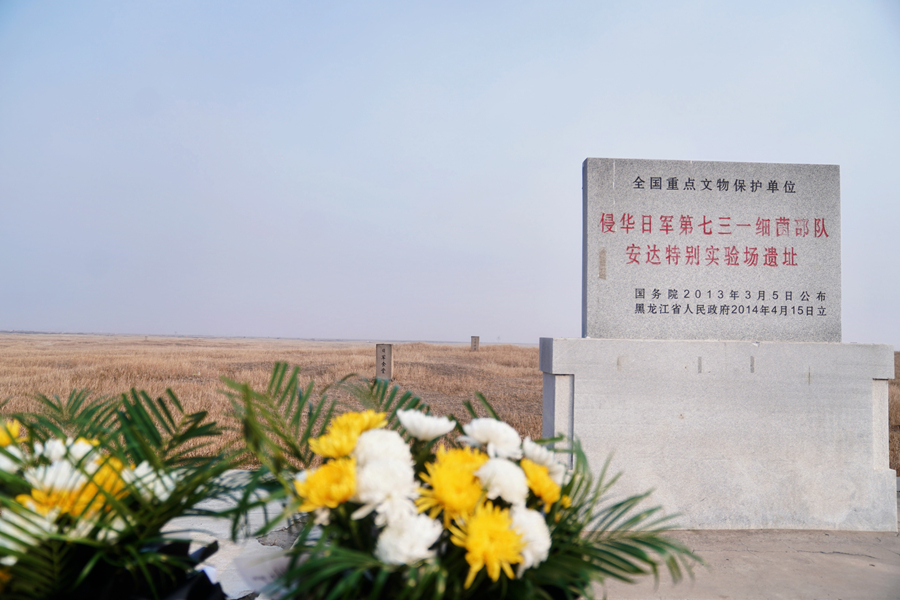A Chinese historical war drama titled "731," which revisits the horrific World War II-era human experiments conducted by Japan's notorious Unit 731, is set to premiere Sept. 18, a producer told China.org.cn on Sunday.

A poster for "731." [Image courtesy of Changchun Film Group Corporation]
The film, directed by Zhao Linshan and starring Jiang Wu, Wang Zhiwen, Li Naiwen and Lin Ziye, exposes how Unit 731 conducted secret biological warfare research in 1940s Harbin before China's 1945 victory in the War of Resistance Against Japanese Aggression. It depicts the crimes against humanity through civilian perspectives while showcasing Chinese resistance to Japanese occupation.
The story depicts how Unit 731 arrested civilians for human experiments as Japan faced defeat. Victims such as vendor Wang Yongzhang were captured and taken to a prison with false promises of freedom in exchange for cooperating with medical research, then subjected to frostbite experiments, poison gas exposure and vivisection.
Unit 731 operated as Japan's top-secret biological and chemical warfare research base from 1936 to 1945 in Harbin, serving as the nerve center for Japanese biological warfare throughout China and Southeast Asia during World War II.
Today, the Exhibition Hall of Evidences of Crime Committed by Unit 731 of the Japanese Imperial Army in Harbin preserves the original site, housing about 100,000 pieces of war crime evidence. Visitors can explore remaining facilities including ruins of headquarters, bacterial laboratories, prison remains, underground breeding rooms, frostbite labs, boiler rooms and gas chambers. As history's largest germ warfare facility, the site documents human experiments that killed at least 3,000 test subjects and harmed more than 300,000 people across China. Victims also included Korean, Mongolian and Soviet prisoners of war.
Unit 731's experiments were designed to culminate in "Operation Cherry Blossoms at Night," a Japanese biological warfare plot targeting cities in Southern California in retaliation for the U.S. bombing of Japanese cities. The operation was scheduled for Sept. 22, 1945, but was canceled following Japan's Aug. 15 surrender. The plan originated with Surgeon General Shiro Ishii, Unit 731's director. Despite the unit's documented wartime atrocities, Ishii received immunity from prosecution in exchange for sharing research with U.S. biological defense programs. This decision continues to provoke outrage in China.
Jin Chengmin, head of the Unit 731 crime evidence exhibition hall, served as the film's historical adviser. "This is history that must never be forgotten," he said.
Actor Xu Guangyu, a cast member, shared an online video underscoring the film's historical weight. "Some may have forgotten what Unit 731 truly did," he said. "They dehumanized victims as 'marutas' - subjecting them to extreme torture. Not even pregnant women, children or prisoners of war were spared. It's precisely because we remember this pain that we've channeled our resolve into building China's present prosperity and stability."
This year marks the 80th anniversary of victory in China's War of Resistance Against Japanese Aggression and the World Anti-Fascist War. Commemorative events will be held in Beijing this September and across other Chinese cities. The Chinese People's War of Resistance Against Japanese Aggression was the first to break out and lasted the longest in the World Anti-Fascist War, during which China suffered over 35 million military and civilian casualties. China has designated Sept. 3 as Victory Day to commemorate Japan's formal surrender on Sept. 2, 1945.

Flowers honoring victims of the atrocities, placed by the cast and crew of "731" at a landmark monument erected on the ruins of Unit 731's special experimental ground in Anda, Heilongjiang province, April 7, 2025. [Photo courtesy of Changchun Film Group Corporation]
The release date announcement for "731" has generated strong public interest, with activity soaring on Chinese ticketing platforms at a record-breaking pace. More than 3.9 million users on Maoyan and 2 million on Taopiaopiao — two major Chinese movie platforms — have clicked the "want to see" button for the film. However, due to the film's brutal scenes, producers added a poster warning advising viewers under 18 to watch with caution.
The release date also coincides with the anniversary of the September 18 Incident in 1931, which marked the beginning of Japan's invasion of China.
This year, China has released multiple cultural works commemorating the 80th anniversary of the war's end. Alongside the Unit 731 film, Shen Ao's "Dead to Rights" — a drama about civilians who protected photographic evidence of Nanjing Massacre atrocities — has earned more than 1.5 billion yuan ($209 million) as of Aug. 4, sparking widespread patriotism. Other releases include the documentary "Mountains and Rivers Bearing Witness," the war epic "Dongji Rescue," and the TV series "Our Homeland."


 Share:
Share: 




 京公網安備 11010802027341號
京公網安備 11010802027341號